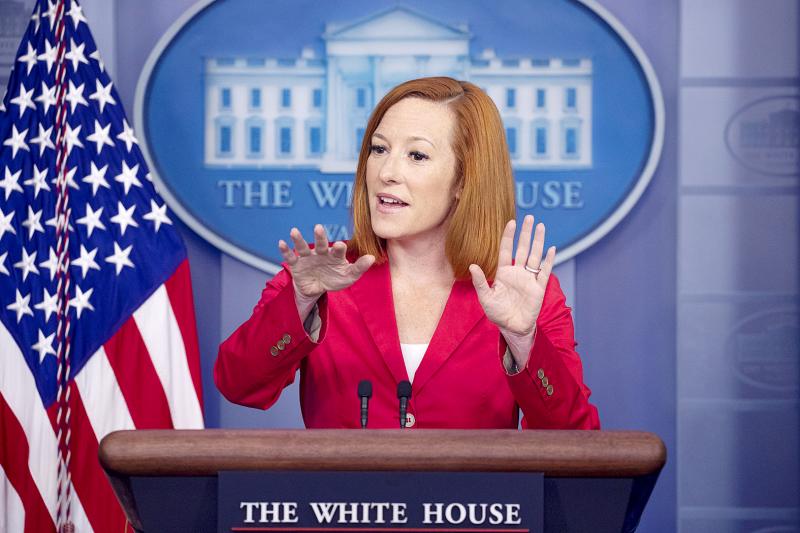The US would continue to strengthen its trade relationship with Taiwan ahead of bilateral trade talks today, despite Beijing’s call on Washington to cease all forms of official exchanges with Taiwan, the White House said on Monday.
After a hiatus of five years, the 11th Trade and Investment Framework Agreement (TIFA) council meeting between the US and Taiwan is to take place via videoconference today.
Beijing’s consistent stance on Taiwan is that it objects to any forms of official exchanges between Washington and Taipei, Chinese Ministry of Foreign Affairs spokesman Wang Wenbin (汪文斌) said on June 11, one day after US Trade Representative Katherine Tai (戴琪) and Minister Without Portfolio John Deng (鄧振中) met via videoconference.

Photo: EPA-EFE
“Our support for Taiwan is rock solid,” White House press secretary Jen Psaki said at a news conference in Washington on Monday when asked to comment about Beijing’s pressure.
“We’re committed to the importance of the US-Taiwan trade and investment relationships, and we will continue to strengthen our trade relationship with Taiwan, which is why we are looking forward to the upcoming Trade and Investment Framework Agreement council meeting, which was recently announced,” Psaki said.
The TIFA council meeting is finally resuming after being suspended for years, Representative to the US Hsiao Bi-khim (蕭美琴) wrote on Facebook yesterday, adding that the meeting would lay vital foundations for advancing bilateral cooperation on the economy and trade.
Over the past decade, bilateral disagreements over pork and beef products had been the primary reason for the stagnation of the trade ties, she said.
Citing the remarks of an official who had worked under former US president George W. Bush, Hsiao said the Bush administration once mulled commencing trade talks with Taiwan while it was negotiating with South Korea, but dropped the plan because Taiwan did not have the determination to resolve those disagreements at that time.
The government has since set up maximum residue levels for ractopamine in US pork products as per the UN’s Codex Alimentarius, showing its resolve to comply with international standards and open the door to trade negotiations with the US, she said.
Whether it was the “America first” policy of former US president Donald Trump or the “worker-centered” trade policy advocated by Tai, Taiwan had to take into account Washington’s concerns so that it could make a breakthrough on bilateral trade and create win-win situations, she added.
Apart from certain issues that each side is concerned with, other areas of bilateral cooperation are climate action, the green economy, the digital economy and supply chain resilience, Hsiao said.
The supply chains include semiconductors, information and communications products, medicines and medical supplies, she said.
Taiwan could also look to negotiate the right to manufacture US-developed COVID-19 vaccines, given the US has backed a WTO effort to waive intellectual property protections, she said.
Hsiao said that she hopes that through the TIFA council meeting and the Economic Prosperity Partnership Dialogue launched last year, Taiwan and the US would continue to deepen relations and build momentum toward the signing of a bilateral trade agreement.

A magnitude 7.0 earthquake struck off Yilan at 11:05pm yesterday, the Central Weather Administration (CWA) said. The epicenter was located at sea, about 32.3km east of Yilan County Hall, at a depth of 72.8km, CWA data showed There were no immediate reports of damage. The intensity of the quake, which gauges the actual effect of a seismic event, measured 4 in Yilan County area on Taiwan’s seven-tier intensity scale, the data showed. It measured 4 in other parts of eastern, northern and central Taiwan as well as Tainan, and 3 in Kaohsiung and Pingtung County, and 2 in Lienchiang and Penghu counties and 1

A car bomb killed a senior Russian general in southern Moscow yesterday morning, the latest high-profile army figure to be blown up in a blast that came just hours after Russian and Ukrainian delegates held separate talks in Miami on a plan to end the war. Kyiv has not commented on the incident, but Russian investigators said they were probing whether the blast was “linked” to “Ukrainian special forces.” The attack was similar to other assassinations of generals and pro-war figures that have either been claimed, or are widely believed to have been orchestrated, by Ukraine. Russian Lieutenant General Fanil Sarvarov, 56, head

SAFETY FIRST: Double the number of police were deployed at the Taipei Marathon, while other cities released plans to bolster public event safety Authorities across Taiwan have stepped up security measures ahead of Christmas and New Year events, following a knife and smoke bomb attack in Taipei on Friday that left four people dead and 11 injured. In a bid to prevent potential copycat incidents, police deployments have been expanded for large gatherings, transport hubs, and other crowded public spaces, according to official statements from police and city authorities. Taipei Mayor Chiang Wan-an (蔣萬安) said the city has “comprehensively raised security readiness” in crowded areas, increased police deployments with armed officers, and intensified patrols during weekends and nighttime hours. For large-scale events, security checkpoints and explosives

‘POLITICAL GAME’: DPP lawmakers said the motion would not meet the legislative threshold needed, and accused the KMT and the TPP of trivializing the Constitution The Legislative Yuan yesterday approved a motion to initiate impeachment proceedings against President William Lai (賴清德), saying he had undermined Taiwan’s constitutional order and democracy. The motion was approved 61-50 by lawmakers from the main opposition Chinese Nationalist Party (KMT) and the smaller Taiwan People’s Party (TPP), who together hold a legislative majority. Under the motion, a roll call vote for impeachment would be held on May 19 next year, after various hearings are held and Lai is given the chance to defend himself. The move came after Lai on Monday last week did not promulgate an amendment passed by the legislature that